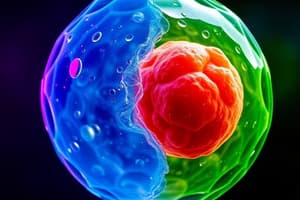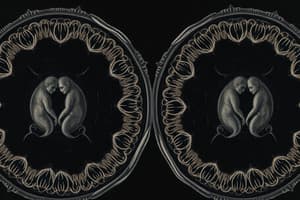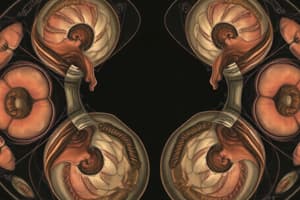Podcast
Questions and Answers
What role do cyclin-dependent kinases (CDKs) play in the cell cycle?
What role do cyclin-dependent kinases (CDKs) play in the cell cycle?
- They promote the degradation of chromosomes.
- They initiate apoptosis in damaged cells.
- They directly cause mutations in DNA.
- They help regulate the progression of the cell cycle. (correct)
Which of the following processes is essential for maintaining the integrity of the genome during cell division?
Which of the following processes is essential for maintaining the integrity of the genome during cell division?
- Cytokinesis
- DNA replication
- Nuclear envelope breakdown
- Chromosome segregation (correct)
What is the effect of errors in chromosome segregation during cell division?
What is the effect of errors in chromosome segregation during cell division?
- Increased apoptosis in healthy cells.
- Formation of additional spindle fibers.
- Development of aneuploidy in daughter cells. (correct)
- Enhanced growth factor signaling.
During which phase of mitosis do spindle fibers connect to kinetochores?
During which phase of mitosis do spindle fibers connect to kinetochores?
How do external signals like growth factors influence the cell cycle?
How do external signals like growth factors influence the cell cycle?
What is the primary purpose of mitosis in organisms?
What is the primary purpose of mitosis in organisms?
During which phase of mitosis do chromosomes align at the metaphase plate?
During which phase of mitosis do chromosomes align at the metaphase plate?
What mechanism is used for cytokinesis in animal cells?
What mechanism is used for cytokinesis in animal cells?
What occurs during meiosis I that contributes to genetic diversity?
What occurs during meiosis I that contributes to genetic diversity?
How many haploid daughter cells are produced at the end of meiosis?
How many haploid daughter cells are produced at the end of meiosis?
What is the role of checkpoints in the cell cycle?
What is the role of checkpoints in the cell cycle?
Which phase of meiosis is most similar to mitosis?
Which phase of meiosis is most similar to mitosis?
In which phase of mitosis do sister chromatids separate?
In which phase of mitosis do sister chromatids separate?
Flashcards
Cell Division
Cell Division
The process where one cell divides into two or more daughter cells, crucial for growth, development, and repair.
Mitosis
Mitosis
Cell division that produces genetically identical daughter cells, essential for tissue growth and repair.
Meiosis
Meiosis
Cell division producing genetically diverse cells, vital for sexual reproduction.
Prophase (Mitosis)
Prophase (Mitosis)
Signup and view all the flashcards
Metaphase (Mitosis)
Metaphase (Mitosis)
Signup and view all the flashcards
Cytokinesis
Cytokinesis
Signup and view all the flashcards
Meiosis I & Meiosis II
Meiosis I & Meiosis II
Signup and view all the flashcards
Crossing Over (Meiosis)
Crossing Over (Meiosis)
Signup and view all the flashcards
Cancer and cell cycle
Cancer and cell cycle
Signup and view all the flashcards
Chromosome segregation
Chromosome segregation
Signup and view all the flashcards
Aneuploidy
Aneuploidy
Signup and view all the flashcards
Spindle fibers and segregation
Spindle fibers and segregation
Signup and view all the flashcards
Genetic abnormalities
Genetic abnormalities
Signup and view all the flashcards
Study Notes
Cell Division Overview
- Cell division is the process by which a single cell divides into two or more daughter cells. It is essential for growth, development, and repair in organisms.
- Two main types of cell division exist: mitosis and meiosis. Mitosis produces genetically identical daughter cells, crucial for tissue growth and repair. Meiosis produces genetically diverse daughter cells, critical for sexual reproduction.
Mitosis Stages
- Mitosis involves a series of distinct phases, ensuring accurate chromosome segregation:
- Prophase: Chromatin condenses into chromosomes, visible under a microscope. The nuclear envelope breaks down, and spindle fibers begin to form.
- Prometaphase: Spindle fibers attach to the kinetochores of the chromosomes. Chromosomes begin to move.
- Metaphase: Chromosomes align along the metaphase plate (equator of the cell). This alignment is critical for equal chromosome segregation.
- Anaphase: Sister chromatids separate and are pulled towards opposite poles of the cell by the spindle fibers.
- Telophase: Chromosomes arrive at the poles, decondense, and a new nuclear envelope forms around each set of chromosomes.
Cytokinesis Mechanisms
- Cytokinesis is the division of the cytoplasm to form two separate daughter cells.
- In animal cells, a cleavage furrow forms, pinching the cell membrane to create two separate cells.
- In plant cells, a cell plate forms, which eventually develops into a new cell wall, separating the two daughter cells.
Meiosis Process
- Meiosis is a specialized type of cell division that produces gametes (sex cells) with half the number of chromosomes as the parent cell. This is essential for sexual reproduction.
- Meiosis involves two rounds of division: meiosis I and meiosis II.
- Meiosis I:
- Homologous chromosomes pair up and undergo crossing over (exchange of genetic material), a key source of genetic diversity.
- Homologous chromosomes separate, reducing the chromosome number by half.
- Meiosis II:
- Sister chromatids separate, similar to mitosis.
- Four haploid daughter cells are produced, each genetically unique.
Cell Cycle Regulation
- The cell cycle is a tightly controlled series of events that regulates cell growth and division.
- Key checkpoints ensure accurate DNA replication and chromosome segregation.
- Checkpoints control transitions between different phases of the cycle.
- Mutations in cell cycle regulation genes can lead to uncontrolled cell division, a hallmark of cancer. These mutations can affect the proteins that control the cycle, such as cyclin-dependent kinases (CDKs).
- External signals, such as growth factors, also play a role in regulating cell cycle progression. These factors influence the activation and inactivation of proteins involved in cell cycle control.
Chromosome Segregation
- Chromosome segregation is the accurate distribution of chromosomes into daughter cells during both mitosis and meiosis.
- Errors in chromosome segregation can lead to aneuploidy (incorrect number of chromosomes) in daughter cells.
- Spindle fibers are essential for accurate chromosome segregation. They connect to the kinetochores of chromosomes and facilitate their movement during anaphase.
- Accurate segregation is fundamental to maintaining the integrity of the genome and preventing genetic abnormalities.
Studying That Suits You
Use AI to generate personalized quizzes and flashcards to suit your learning preferences.




